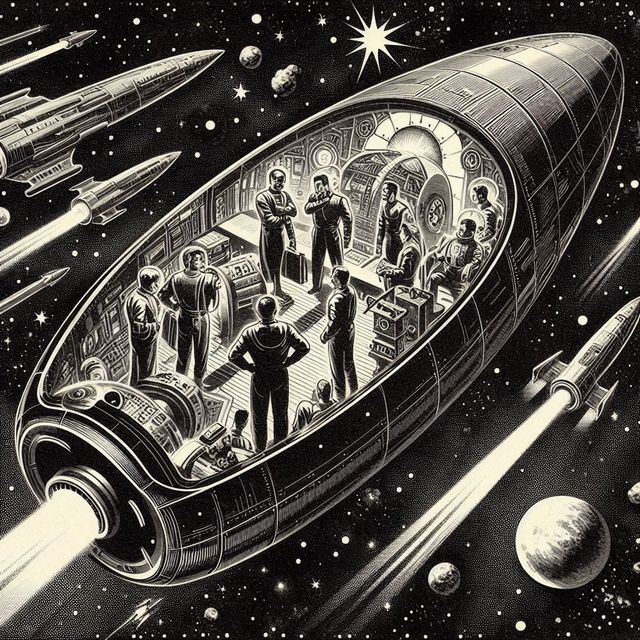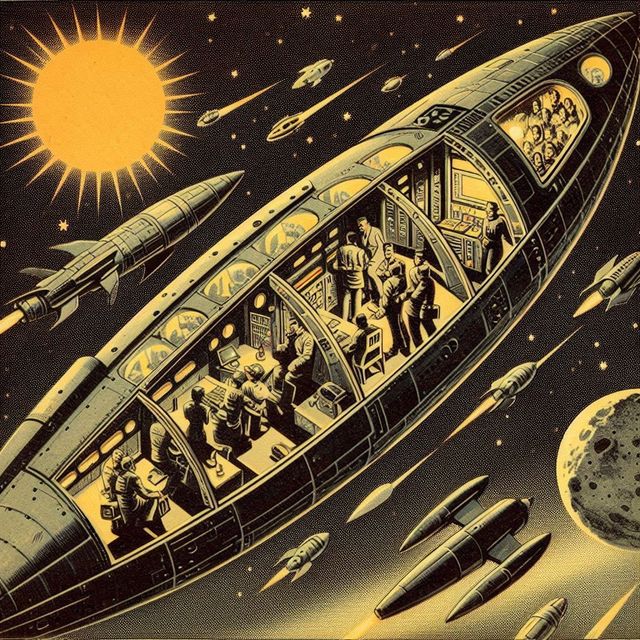-
Vijay Fafat
- Published on
A story which highlights the fact that while statistics have their place in evaluation of circumstances, one must always understand that ex post surprises, even those of many standard deviations from mean, are quite possible when your assumptions on the prior probability of distribution are suspect.
Most of the story revolves around the discussion around this point as well as the recovery of a spaceship hit by a meteorite. The ship is part of a fleet patrolling a sector in space.
Dr. Frank Thomas, “Chief Chemist, and Officer Commanding Vehicle Five – Chemistry”, is a natural skeptic who feels that crew members are generally too sanguine about the risks of random cosmic events compromising the safety of the ships. Subsequent events of further hits by meteorites prove him right, though the fleet does not come to much harm.
An extended excerpt should give an idea about his cynical outlook. Reading the story, I was reminded about Wall Street’s financial modeling based on assumptions of joint-Normality and inconsistently ad hoc use of “fat tails”, “volatility surfaces”, non-stationary correlation matrices, and the like, leading to models breaking down in their statistical predictions too often, with the financial “experts” speaking foolishly about “once-in-ten-thousand-years flood” which happens every 20 years . No wonder they say that economists have successfully predicted eleven out of the last four recessions…
“It was, perhaps, ironical that this should happen to Thomas, whose preoccupation with the probabilities of meteorite collisions —the main hazard to space-going vehicles and personnel — was notorious. For Frank Thomas was one spaceman who had no faith whatever in the so-called periods of immunity implied by the statistics. Not that he seriously challenged the statistics themselves. Worked out on paper in the middle nineteen-sixties, they had been confirmed rather than modified by fifty years of intervening practical experience. They had, indeed, been a kind of manual of arms for operating satellite stations and space rockets since Satellite Space Station Commonwealth One had been established in this very ninety-minute orbit. But Thomas did question certain glib assumptions which were supposed to be based on the statistics, and he could always be relied upon to put up a strenuous argument when his point of view was challenged.
According to the calculations a space-going vehicle presenting a target of approximately one thousand square feet might reasonably expect to be hit by a meteoritic particle of about thirteen millimeters’ diameter or larger about once in 611,874 years. Or it might be struck by a particle of some five point twenty millimeters’ diameter or larger once in 23,858 years. Or it might even collide with a meteorite the size of a fine sand grain— “1.12 millimeters’ diameter,” the statistics said —once in 233 years, on the average. Fortunately most spacemen anticipated spending little more than ten or twelve years of their lives in space—a few, perhaps, up to twenty years. So they quite naturally rated their chances of never meeting even a sand-grain meteorite as better than an average sailor’s chances of never being shipwrecked. According to the statistics, their anticipations were sound enough …
“On the average! ” Frank Thomas would always insist. “Don’t forget —the statistics mean nothing if they don’t also mean an occasional inevitable hit as well as long periods of immunity! And don’t forget, either, that the smallest vehicle here in “Two” is more than two thousand square feet in longitudinal section. I refer to Station Commonwealth One, as you know. Most of us are bigger than three thousand square foot targets. Chemistry Vehicle is five thousand or more. We must divide those years of immunity, so called, by five! Our two hundred and thirty-three years become less than fifty!”
“One grain of sand in fifty years!” someone had once protested.
“Traveling at a hundred thousand miles an hour, or more,” Thomas had retorted, “even that would sting a bit! And don’t forget that ’One’ was out here only thirty-two years when something as big as your fist went right through her!
“According to the statistics,” was the reply, given with a grin, “that should make this vicinity safe for anything up to a half million years!” At that point Thomas would throw up his hands in bitter protest. It was just the kind of gratuitous assumption which never failed to exasperate him. “On the average!’ his companions would chorus, knowing what he had in mind to say. And he would grin back, and not say it. For he had explained too often that, although “once in a thousand years on the average’’ could mean that you might go a thousand years, or two thousand, without a hit, it could just as easily mean that you might collect the quota for two or three thousand years in one day— or one hour. And he had pointed out that if your one meteorite happened to be from a swarm like the Leonids or the Giacobinids, in the season, there would almost certainly be others close by, in space or time … It was therefore inevitable , as Commander Fraser appreciated full well, that from time to time a fragment of cosmic stone or nickel-iron large enough to survive the impact without volatilizing, would whip through one or another of his nineteen vehicles like a bullet through a cardboard box, and then continue on its way…”

